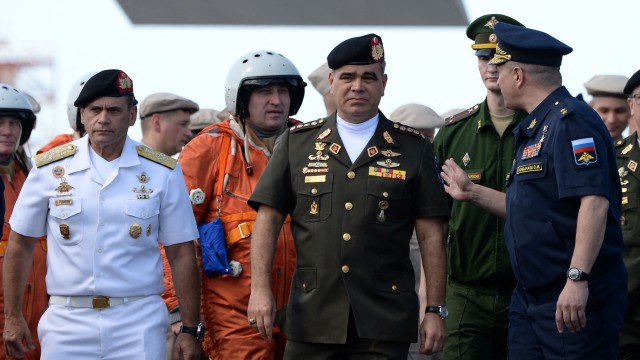
Russia and the Venezuelan regime have pledged to bolster ties only days after Russian Deputy Foreign Minister Sergei Ryabkov threatened to send troops to the South American country amid growing U.S.-Russia tensions over Ukraine. In a phone call, Russian President Vladimir Putin and Venezuela’s Nicolás Maduro discussed key issues of Russian-Venezuelan cooperation and the implementation of joint projects in the economic, energy, and other fields, the Kremlin said on January 20.
By Diálogo – Digital Military Magazine
Feb 25, 2022
The renewed commitment between both countries also comes at a critical time for Maduro, who suffered a rare electoral loss in Hugo Chávez’s home state of Barinas in early January, when his candidate was defeated in a vote to elect the next governor.
For the past two decades, Russia has been propping up the regime in Venezuela, with a strategic partnership that first emerged during Chávez’s early years. According to the Center for Strategic and International Studies (CSIS), the energy sector has been the centerpiece of the relationship between Caracas and the Kremlin.
The Venezuelan regime has also maintained a strong military alliance with Russia. Beginning under Chávez, the Kremlin has sold Venezuela billions of dollars in military equipment, including tanks, fighter jets, and small arms, a series of reports on weapons and military acquisitions dating back to 2005, from Venezuelan nongovernmental Organization (NGO) Control Ciudadano, indicated. According to the NGO’s reports, while China dethroned Russia as Venezuela’s top military provider by 2010, Russia’s military presence on Venezuelan soil is still strong.
“As the political and fiscal crisis of the Venezuelan regime deepened, and its ability to pay its bills diminished, Russia’s military engagement shifted from the purchase of new end items to maintenance, upgrades, training, and other types of support,” Evan Ellis, research professor of Latin American studies at the U.S. Army War College Strategic Studies Institute said in a January 19, 2022 report for the think tank Global Americans. “Periodic Russian deployments to the country included support for Venezuela’s Russian-bought military equipment and air defense systems and mercenaries from the Wagner Group,” Ellis added.
“They have had advisors and military personnel here for some time,” security and defense analyst Francine Jacome, executive director of the Venezuelan Institute for Social and Political Studies (INVESP, in Spanish), told Diálogo. “From what is known, even private military contractors, such as the Wagner Group.”
The Wagner Group is a Russian private military company (PMC), which management and operations are deeply intertwined with the Russian military and intelligence community, CSIS said. “The Russian government has found Wagner and other private military companies to be useful to extend its influence overseas,” the think tank added. In early January 2019, several news media, including The Guardian and Reuters, reported that Wagner operatives had flown to Caracas to beef up Maduro’s security. Both reported that a first group of contractors had arrived ahead of the May 2018 presidential elections.
Another Russian PMC believed to be in Venezuela is Vegacy Strategic Services, also known as VEGA. Little is known about VEGA, yet reports from international affairs and defense policy think tanks Atlantic Council and The Jamestown Foundation indicate that the PMC has been operating in Syria since 2018 to train pro-Bashar al-Assad militants, suggesting that VEGA has been acting with support from the Kremlin.
On December 27, 2021, Major General Johan Hernández Lárez, commander of the Integral Defense Operational Zone (ZODI, in Spanish) 43 for Miranda state – ZODIs are military commands established in each Venezuelan state – said via Twitter that a rapid response unit of the Bolivarian National Guard was training with “international instructors of the special operations company V.E.G.A.” His tweet was soon deleted, but not before people were able to share it on their accounts.
In a January 21, 2022 interview with Colombian magazine Semana, Joseph Humire, executive director of the national security think tank Center for a Secure and Free Society, said the threats from Kremlin authorities had a tinge of irony. “How are you going to threaten to send military troops to a place when you’ve already sent troops to that place?” Humire said.
For Ellis, the matter centered more around deception. “Putin wants to make a bluff on the cheap,” Ellis told Diálogo. “That means that he can’t put in anything that requires a lot of time and expenses to maintain while he’s concentrating on Ukraine and on the other side, nothing that could cause escalation out of his control in a region that he can’t support.”
…
Read More: Diálogo – Digital Military Magazine – Russians Boots in Venezuela
…

